Reading Further - A Great Awakening
advertisement
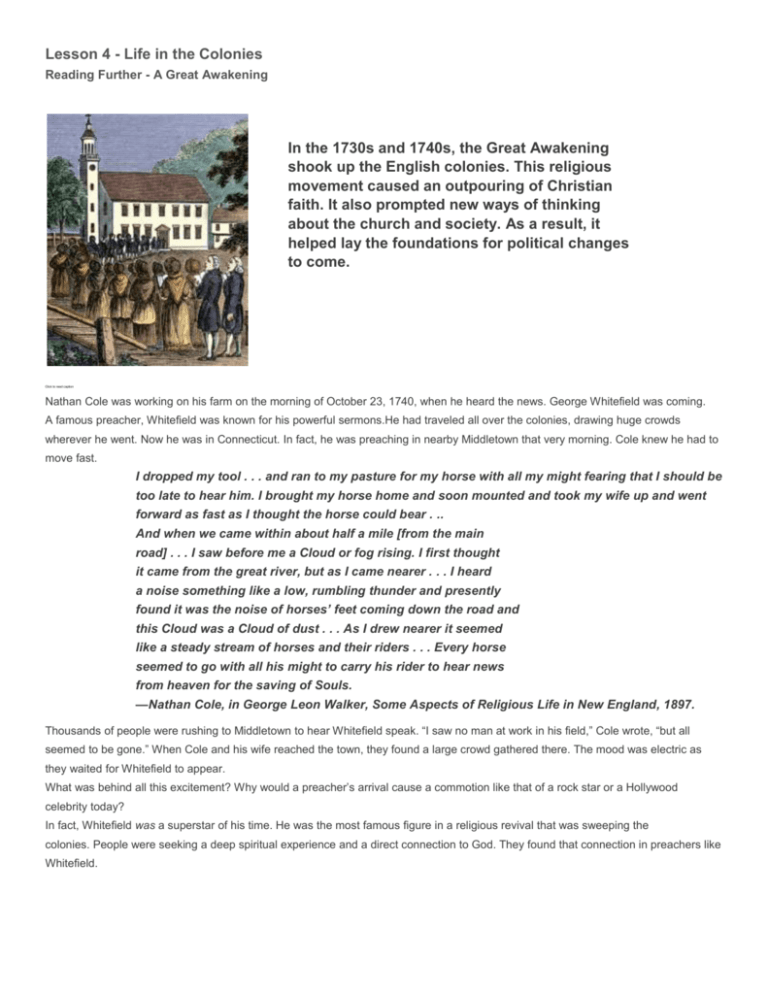
Lesson 4 - Life in the Colonies Reading Further - A Great Awakening In the 1730s and 1740s, the Great Awakening shook up the English colonies. This religious movement caused an outpouring of Christian faith. It also prompted new ways of thinking about the church and society. As a result, it helped lay the foundations for political changes to come. Click to read caption Nathan Cole was working on his farm on the morning of October 23, 1740, when he heard the news. George Whitefield was coming. A famous preacher, Whitefield was known for his powerful sermons.He had traveled all over the colonies, drawing huge crowds wherever he went. Now he was in Connecticut. In fact, he was preaching in nearby Middletown that very morning. Cole knew he had to move fast. I dropped my tool . . . and ran to my pasture for my horse with all my might fearing that I should be too late to hear him. I brought my horse home and soon mounted and took my wife up and went forward as fast as I thought the horse could bear . .. And when we came within about half a mile [from the main road] . . . I saw before me a Cloud or fog rising. I first thought it came from the great river, but as I came nearer . . . I heard a noise something like a low, rumbling thunder and presently found it was the noise of horses’ feet coming down the road and this Cloud was a Cloud of dust . . . As I drew nearer it seemed like a steady stream of horses and their riders . . . Every horse seemed to go with all his might to carry his rider to hear news from heaven for the saving of Souls. —Nathan Cole, in George Leon Walker, Some Aspects of Religious Life in New England, 1897. Thousands of people were rushing to Middletown to hear Whitefield speak. “I saw no man at work in his field,” Cole wrote, “but all seemed to be gone.” When Cole and his wife reached the town, they found a large crowd gathered there. The mood was electric as they waited for Whitefield to appear. What was behind all this excitement? Why would a preacher’s arrival cause a commotion like that of a rock star or a Hollywood celebrity today? In fact, Whitefield was a superstar of his time. He was the most famous figure in a religious revival that was sweeping the colonies. People were seeking a deep spiritual experience and a direct connection to God. They found that connection in preachers like Whitefield. Origins of the Awakening Religion played a major role in the lives of colonists in the early 1700s. Most people attended church regularly. There were a number of different churches, but most provided a similar experience. They emphasized traditional religious teachings. Their ministers were educated men who valued reason over emotion. The atmosphere in church was calm and orderly. Click to read caption Some ministers, however, believed that the church had lost its way.They feared that religion had become a collection of formal, empty rituals. They wanted to wake people up and renew their faith. In their sermons, they offered an emotional message of sin and salvation that was aimed at the heart, not the head. By the 1730s, a split was developing between old-line ministers and those favoring a new way. These two groups became known as the Old Lights and the New Lights. The Old Lights stressed tradition and respect for authority. The New Lights called for a more individual, personal form of worship. They wanted people to feel the spirit of God for themselves. Whitefield and other New Light ministers often preached at open air revivals. They depicted the glories of heaven and the miseries of hell. Hearing these highly charged sermons, many people were seized by feelings of great joy or despair. They would weep, moan, and fall to the ground. As news of the revivals spread, the movement gained strength. Click to read caption Leading Lights: Whitefield and Edwards A number of ministers played key roles in the Great Awakening. The leading figures, however, were George Whitefield and Jonathan Edwards. If Whitefield was the star of the movement, Edwards was its most important thinker. Whitefield was a young Anglican minister in England when he joined the revival movement. In 1739, he defied church authorities by holding revival meetings across the country. That same year, he traveled to the colonies, where he caused a sensation. Whitefield was a magnificent speaker with a beautiful voice and the skills of an accomplished actor. His words and gestures could lift audiences into an emotional frenzy. He toured from Maine to Georgia, appearing in towns and cities along the way. In Boston, some 20,000 people gathered to hear him speak. He was the most celebrated man in America. Whitefield was pleased with his success. But he was also troubled by the wealth and vanity he saw in the colonies. Noting the fine clothing worn by wealthy citizens, he argued that Christians should dress simply and plainly. In Boston, he was disturbed to see young children dressed in fancy clothes: The little infants who were brought to baptism were wrapped up in such fine things . . . that one would think they were brought thither [there] to be initiated into, rather than to renounce, the pomps and vanities of this wicked world. While in Massachusetts, Whitefield visited Jonathan Edwards at his home in Northampton. Edwards had helped start the revival movement and had been a great influence on Whitefield. Edwards, in turn, recognized that Whitefield had given new life to the movement. He decided to increase his own efforts to win converts. In this way, he said, he hoped to “make New England a kind of heaven upon earth.” Click to read caption Edwards began to preach in neighboring towns. In 1741, he gave his most famous sermon in Enfield, Connecticut. Called “Sinners in the Hands of an Angry God,” this sermon was directed at a congregation that had resisted the revival message. Edwards told them that they had angered God with their sinful ways. God held them in his hand, he said, and could cast them into hell at any moment. The God that holds you over the pit of hell, much as one holds a spider . . . is dreadfully provoked; his wrath towards you burns like fire . . . ’Tis nothing but his hand that holds you from falling into the fire . . . Oh sinner! Consider the fearful danger you are in . . . And now you have an extraordinary opportunity, a day wherein Christ has flung the door of mercy wide open, and stands in the door calling and crying with a loud voice to poor sinners; . . . many that were very lately in the same miserable condition you are in, are in now a happy state, . . . rejoicing in the hope of the glory of God. How awful is it to be left behind at such a day! These words had a devastating effect. The congregation began to wail and beg for mercy. The “shrieks and cries were piercing,” wrote one witness. The uproar was so great that Edwards could not even finish his sermon. The Impact of the Awakening Over the next few years, such incidents became more common. At the same time, the split between Old Light and New Light ministers grew wider. Churches were breaking apart. For the sake of unity, both sides agreed to make peace and heal their divisions. By the late 1740s, the Great Awakening was over. The impact of the movement was deep and ongoing, however. New Light preachers had encouraged people to think for themselves and to make their own choices about religious faith. As a result, the church no longer had absolute authority in religious matters. Preachers also taught that everyone was equal in the eyes of God. As one preacher said, “The common people . . . claim as good a right to judge and act for themselves . . . as civil rulers or the learned clergy.” By encouraging people to act independently and defy authority, the Great Awakening helped lay the groundwork for rebellion against British rule.
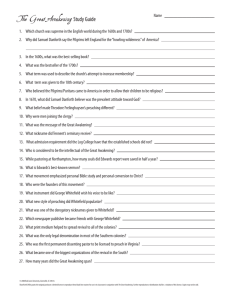
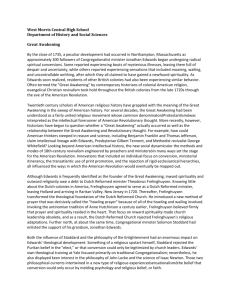
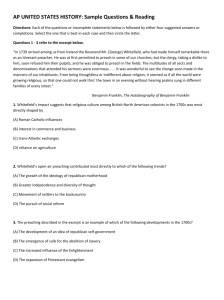
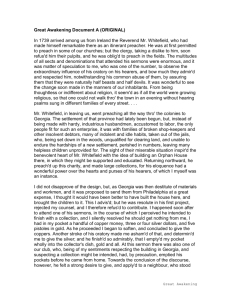
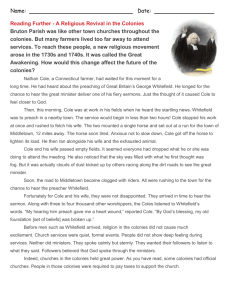

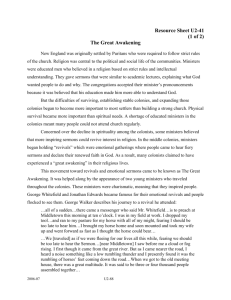
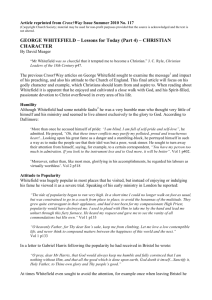
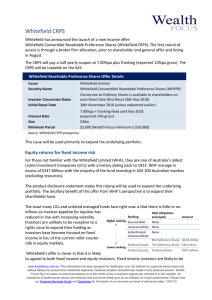
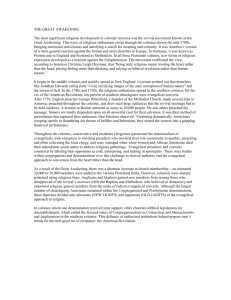
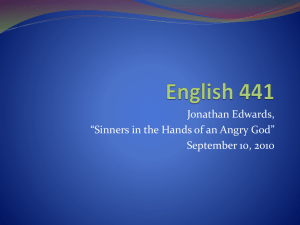

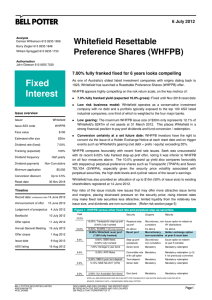
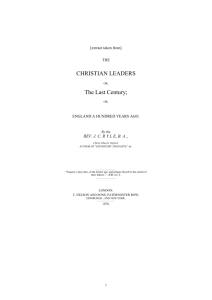
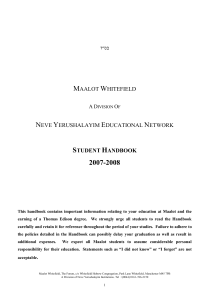
![docx [MS Word] - Gordon College Faculty](http://s2.studylib.net/store/data/010020382_1-d4676313f3e39ca2962c389ea4c26903-300x300.png)
![docx [MS Word] - Gordon College Faculty](http://s3.studylib.net/store/data/007199143_1-933e17a46ca03333682f2042ed30e361-300x300.png)